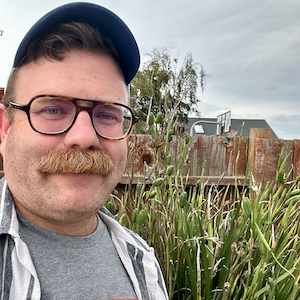Campus News
Campus secures funding for innovative research projects addressing climate action and linguistic diversity
Two cutting-edge research projects led by the University of California, Santa Cruz have been awarded funding through the University of California’s Multicampus Research Programs and Initiatives (MRPI). This underscores the university’s leadership in advancing creative and impactful solutions to global challenges.

Two cutting-edge research projects led by the University of California, Santa Cruz have been awarded funding through the University of California’s Multicampus Research Programs and Initiatives (MRPI). This underscores the university’s leadership in advancing creative and impactful solutions to global challenges.

The UC Climate Action Arts Network (CAAN), spearheaded by Associate Professor of Art Karolina Karlic and Professor of Art Jennifer Parker, received nearly $2 million to leverage art and design as a powerful medium to engage the public in climate resilience and sustainability.
CAAN builds on the foundational work of the 2019 MPRI Placemaking Planning Grant, which focused on creative placemaking to advance environmental and social justice.
The initiative unites cultural and artistic programming rooted in climate justice across UC campuses to inspire public engagement and align with California’s Climate Adaptation Strategies.
With its system-wide collaboration involving seven other UC campuses – including Teddy Cruz and Fonna Forman from UC San Diego; Jill Miller and Asma Kazmi from UC Berkeley; Brett Snyder and Glenda Drew from UC Davis; Sarah Rosalena from UC Santa Barbara; Michelle (Latipa) Dizon from UC Riverside; Patricia Vergara and Jayson Beaster-Jones from UC Merced; and Juli Carson from UC Irvine – CAAN is poised to amplify the role of arts in fostering climate justice, engaging vulnerable communities, and driving sustainable change.
“Our work highlights the importance of interdisciplinary collaboration,” Karlic said. “With the inclusion of colleagues across the UC system, we are not just addressing climate change—we are engaging our local and global communities to take meaningful action through the arts.”

The project will also provide competitive fellowships, build community partnerships, and support workforce development in arts-driven climate solutions.
“This grant allows us to deepen the intersection of art and climate action,” said Parker. “By integrating the voices of artists and researchers from all UC campuses, we are fostering a network that addresses pressing environmental issues and amplifies creativity as a catalyze societal change.”
In a second project, Leveraging California’s Linguistic Diversity to Improve Large Language Models, UC Santa Cruz linguistics professor Matthew Wagers leads a team investigating how AI systems can better reflect California’s rich linguistic and neurocognitive diversity. Awarded $154,659 for a planning grant, the project will assess gaps in the accessibility of large language models (LLMs), such as ChatGPT, for users outside standard linguistic norms.
“Technology built on LLMs has promised to transform many aspects of our lives, but we don’t know whether they meet the needs of Californians whose linguistic identities don’t align with the socioculturally dominant varieties these tools tend to replicate,” Wagers explained.
By capitalizing on a growing network of psycholinguists and language scientists at six other UC campuses, this project aims to understand how to create AI tools that are more inclusive and equitable for California’s diverse population. In the initial period, investigators have planned to carry out new language processing experiments, host technical workshops and develop curricular resources.
These MRPI-funded initiatives highlight UC Santa Cruz’s excellence in addressing critical societal challenges through interdisciplinary innovation and collaboration, reinforcing its reputation as a leading public research university.